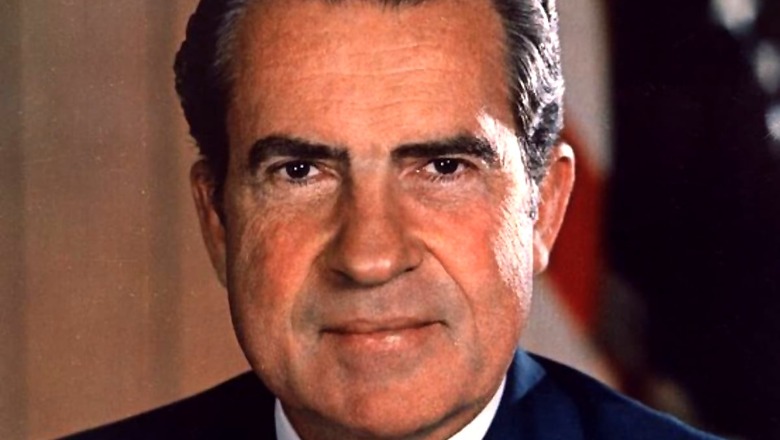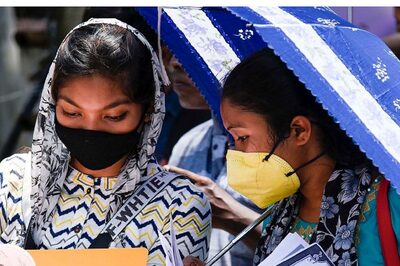
views
Much has been written about the bad chemistry between the then US President Richard Nixon and Indian Prime Minister Indira Gandhi. Princeton University Professor Gary J. Bass quoting from the newly declassified White House documents said they revealed a “stunning conversation” between Nixon, Kissinger, the then-White -House chief of staff H.R. Haldeman in the Oval Office on June 17, 1971.
Even before Indira Gandhi’s state visit on November 4 and 5, 1971, Nixon made vulgar remarks about India and her. “Undoubtedly the most unattractive women in the world is the Indian women, said Nixon repeating “Undoubtedly” again in a venomous tone.
Nixon showed his racist mindset and said, “The most sexless, nothing, these people. I mean, people say, what about the Black Africans? Well, you can see something, the vitality there, I mean they have a little animal-like charm, but God, those Indians, ack, pathetic. Uch.”
While for some reason Nixon and Gandhi did not hit it off, his predecessor President Lyndon Johnson made much of her first visit in 1966, a few months after she became the Prime Minister.
Johnson was gushing about her. Good personal chemistry between Johnson and Indira helped India secure more food and development aid from the US. But later, due to Johnson’s tight-fisted attitude to PL 480 and New Delhi’s refusal to support the US on Vietnam, the relations became strained. Indira was upset when he refused to release the last PL 480 instalments; she said, “ Never again” and went for Green Revolution.
Nixon felt that during Prime Minister Indira Gandhi’s second state visit to the US on November 4 and 5, 1971 that she was condescending and extended his dislike to all the Indians. On November 4, 1971, during a private break from a White House summit Nixon revealed to his National Security Adviser Henry Kissinger about Indians and said, “To me, they turn me off. How the hell do they turn other people on, Henry? Tell me.”
On November 5, in a private meeting, “The Indians are bastards anyway,” Kissinger told the president. “They are starting a war there.”
Kissinger also told his boss that he had bested Indira in their meeting the previous day. “While she was a bitch, we got what we wanted too,” Kissinger said and added, “She will not be able to go home and say that the United States didn’t give her a warm reception and therefore in despair she’s got to go to war.”
Indira Gandhi’s visit took place amidst the apprehensions of an impending war between India and Pakistan. For various reasons, the visit went wrong from the beginning. Mr and Mrs Nixon received Mrs Gandhi at the White House lawns at 10 am on November 4. Indira Gandhi was put off when Nixon offered sympathy for the flood victims of Bihar but made no mention of Bengal refugees. She tactlessly chided the President for ignoring a manmade tragedy in Bangladesh in her reply. After the arrival ceremony, Nixon and Gandhi met at the Oval Office and the meeting went on until 12:30pm. They talked about India-Pakistan, Bangladesh refugees, etc.
Kissinger gives a more descriptive and in-depth account of what happened at the meetings in his book ‘White House years’. Nixon and Gandhi sat in two wing chairs near the fireplace while Kissinger and Cabinet Secretary Haksar sat on the sofa adjoining the chairs. Gandhi was smug and expressed admiration for Nixon’s handling of Vietnam and China, which Nixon resented.
According to Kissinger, the conversation between the two leaders became the ‘”dialogue of the deaf”. “ They failed to hear each other not because they had not understood each other but because they understood each other only too well.” She took up none of the points Nixon made. Instead, she gave a little lecture on the history of Pakistan.
The White House banquet on November 4 also was strained. American ex-diplomat Denis Klux in his book, ‘The estranged neighbours’, writes that neither Gandhi spoke nor Nixon made much of an effort to converse with each other. During dinner even though Mrs Nixon tried unsuccessfully to break the tension with small talk, the atmosphere remained frosty.”
On November 5, Nixon vented his anger and frustration against Gandhi in his private meeting with Kissinger and Halderman from 7.50 am to 9.10 am. Kissinger called it an unprintable vocabulary calling Gandhi a ‘witch and a bitch’. Nixon agreed with Kissinger and commented, “We have slobbered over the old witch.”
Nixon returned the Prime Minister’s slight on November 5 by keeping her waiting for 45 minutes for a meeting at the Oval office. Gandhi kept cool in the brief talks that followed. She was not the one to take any slight from anyone. When Nixon called on her at the Blair House, she kept him waiting for 45 minutes to emerge from her room. Nixon got the message.
In the brief meeting on November 5, Nixon talked about China while Gandhi made no mention of Pakistan at all. “The entire conversation was of world view.” Nixon escorted Gandhi to her car at 12.20 pm after an hour’s talks. Nixon wrote in his diary about Gandhi’s dubious action against the US. “When she had made up her mind to attack Pakistan at the time she saw me and assured me that she would not.”
Gandhi told a journalist that “times have passed when any nation sitting 3 or 4 thousand miles away could give orders to Indians on the basis of colour superiority to do as they wished.” To this Nixon told Henry that “she doesn’t mind the colour of our aid dollars”.
Kissinger says “Thus Mrs Gandhi’s visit ended without progress on any outstanding issues or even on a procedure by which procedure could be brought.”
When the Indo-Pakistan war broke out on December 5, 1971, all hell broke loose. Nixon told Kissinger on December 6, “She was playing with us. You know the cold way she was the next day — she did not (unclear) and this woman suckered us. But let me tell you she is going to pay… She is going to pay. Now I mean on the aid side. ” Nixon wondered if he was “too easy on that goddamn woman when she was here”. He then asked Kissinger whether the Chinese would make a move, which would terrify Indians. Throughout the Indo-Pak war, Nixon was hoping Chinese would step in to petrify India.
Though he agreed with Nixon, Kissinger wrote in his autobiography years later: “Mrs Gandhi was a strong personality relentlessly pursuing India’s national interest with single-mindedness and finesse. I respected her strength even when her policies were hurtful to our national interest.”




















Comments
0 comment